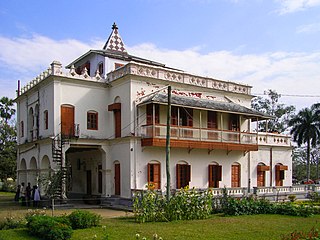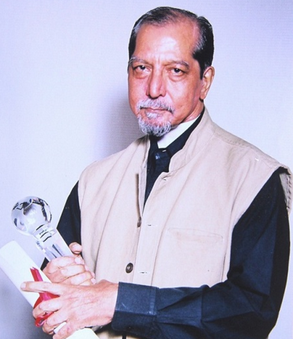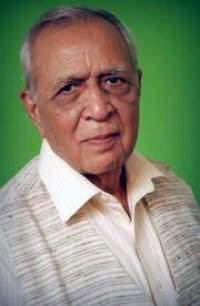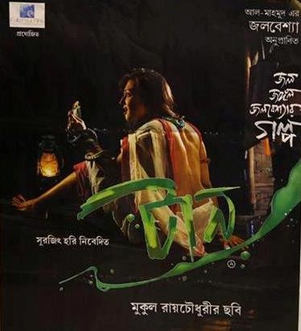Related Research Articles

Rabindra Sangeet, also known as Tagore Songs, are songs from the Indian subcontinent written and composed by the Bengali polymath Rabindranath Tagore, winner of the 1913 Nobel Prize in Literature, the first Indian and also the first non-European to receive such recognition. Tagore was a prolific composer with approximately 2,232 songs to his credit. The songs have distinctive characteristics in the music of Bengal, popular in India and Bangladesh.

Charulata is a 1964 Indian drama film written and directed by Satyajit Ray. Based upon the novel Nastanirh by Rabindranath Tagore, it stars Soumitra Chatterjee, Madhabi Mukherjee and Sailen Mukherjee. The film is considered one of the finest works of Ray and is often featured in the lists of the greatest films ever made.
Indian English literature (IEL), also referred to as Indian Writing in English (IWE), is the body of work by writers in India who write in the English language but whose native or co-native language could be one of the numerous languages of India. Its early history began with the works of Henry Louis Vivian Derozio and Michael Madhusudan Dutt followed by Rabindranath Tagore and Sri Aurobindo. R. K. Narayan, Mulk Raj Anand and Raja Rao contributed to the growth and popularity of Indian English fiction in the 1930s. It is also associated, in some cases, with the works of members of the Indian diaspora who subsequently compose works in English.

The works of Rabindranath Tagore consist of poems, novels, short stories, dramas, paintings, drawings, and music that Bengali poet and Brahmo philosopher Rabindranath Tagore created over his lifetime.

Rabindranath Tagore was a Bengali polymath who was active as a poet, writer, playwright, composer, philosopher, social reformer, and painter during the age of Bengal Renaissance. He reshaped Bengali literature and music as well as Indian art with Contextual Modernism in the late 19th and early 20th centuries. Author of the "profoundly sensitive, fresh and beautiful" poetry of Gitanjali, he became in 1913 the first non-European and the first lyricist to win the Nobel Prize in Literature. Tagore's poetic songs were viewed as spiritual and mercurial; where his elegant prose and magical poetry were widely popular in the Indian subcontinent. He was a fellow of the Royal Asiatic Society. Referred to as "the Bard of Bengal", Tagore was known by sobriquets: Gurudeb, Kobiguru, and Biswokobi.
Sombhu Mitra was an Indian film and stage actor, director, playwright, reciter and an Indian theatre personality, known especially for his involvement in Bengali theatre, where he is considered a pioneer. He remained associated with the Indian People's Theatre Association (IPTA) for a few years before founding the Bohurupee theatre group in Kolkata in 1948. He is most noted for films like Dharti Ke Lal (1946), Jagte Raho (1956), and his production of Rakta Karabi based on Rabindranath Tagore's play in 1954 and Chand Baniker Pala, his most noted play as a playwright.
The Tagore family has been one of the leading families of Kolkata, India, and is regarded as one of the key influencers during the Bengali Renaissance. The family has produced several people who have contributed substantially in the fields of business, social and religious reformation, literature, art and music.

K. K. Mahajan was an Indian cinematographer who was known for his work in Parallel Cinema. In a career that spanned over four decades, he won four National Film Awards. He was best known for his work with filmmakers such as Kumar Shahani, Mani Kaul, Basu Chatterjee and Mrinal Sen.
Tripti Mitra was a popular Indian actress of Bengali theatre and films, and wife of Sombhu Mitra, noted theatre director, with whom she co-founded pioneering theatre group Bohurupee in 1948. She has acted in films like Jukti Takko Aar Gappo and Dharti Ke Lal.

Bohurupee is a Bengali premier theatre group. Bohurupee was founded in 1948 by several active members who left the Indian People's Theatre Association. The group was created to present the experimental Bengali drama in unusual form.

The group theatre of Kolkata refers to a tradition in theatres in the Indian city Kolkata, which developed in the 1940s as an alternative to entertainment-oriented theatres. As opposed to commercial theatres, group theatre is "a theatre that is not professional or commercial", characterized by its tendency for experimentation in theme, content and production, and its aim of using the proscenium stage to highlight social messages, rather than having primarily making-money objectives.

Elar Char Adhyay is a 2012 Bengali film. The film is directed by Bappaditya Bandopadhyay, produced by Dreamz Movies and Entertainment Pvt. Ltd. and based on Rabindranath Tagore's 1934 novel Char Adhyay.

Arpita Ghosh, is an Indian theatre artist and politician who serves as a Member of Parliament, Rajya Sabha from West Bengal. She has served as the Member of Parliament of the 16th Lok Sabha for Balurghat, West Bengal. She won the 2014 Indian general election being an All India Trinamool Congress candidate.

Bholabhai Patel was an Indian Gujarati author. He taught numerous languages at Gujarat University and did comparative studies of literature in different languages. He translated extensively and wrote essays and travelogues. He was awarded the Padma Shri in 2008.

Taan is a 2014 Indian Bengali drama film, written and directed by Mukul Roy Chowdhury. The film is based on the life of prostitutes and human trafficking.

Nandini Ghosal is an Indian Bengali classical dancer, choreographer and actress. After making her acting debut in the 1997 drama film Char Adhyay, Nandini played leading role in several Bengali films, such as Kichhhu Sanlap Kichhu Pralap (1999) and a Malayalam movie Sthithi (2003).
Char Adhyay is a political novel written in Bengali by Rabindranath Tagore. It was published in 1934. This is the last novel written by Rabindranath. The novel has a connection with the story of Rabindranath's "Rabibar".

Swarnakumari Devi, also known as Swarnakumari Tagore, Swarnakumari Ghosal, Svarṇakumārī Debī and Srimati Svarna Kumari Devi, was an Indian Bengali writer, editor, essayist, poet, novelist, playwright, composer, and social worker.
References
- 1 2 Rabindranath Tagore (2011). The Essential Tagore. Harvard University Press. p. 656. ISBN 978-0-674-05790-6.
- ↑ "Kumar Shahani". The 5th Asia Pacific Triennial of Contemporary Art. Archived from the original on 10 May 2014. Retrieved 3 May 2014.
- 1 2 Madhu Jain (14 July 1997). "Char Adhyay: Tagore novel adaptation is set to create ripples". India Today. Retrieved 4 May 2014.